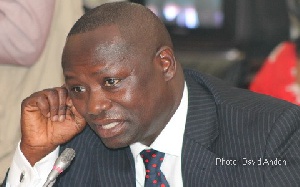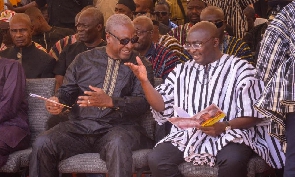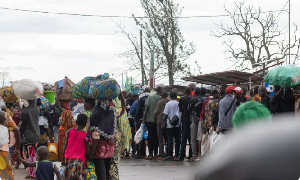There is discord within the corridors of government over the planned takeover of the Ghana National Gas Company (Ghana Gas) by the Ghana National Petroleum Corporation (GNPC).
Reliable sources close to government have told The Finder that power brokers in government opposed to GNPC’s long-held dream of controlling Ghana Gas are angry about the decision.
According to the sources, the announcement was made on their blind side, as well as on the blind side of the Board of Directors, management and staff of Ghana Gas.
The issue was never discussed with Ghana Gas prior to the announcement in Parliament by Finance Minister, Mr Seth Terkper; GNPC bosses were, however, privy to the information, this paper gathered.
And contrary to media reports that the Board of Directors and management of Ghana Gas were informed of the takeover by Wednesday, December 10, 2014 in varied letters dated December 3, 2014, December 9, 2014 and December 10, 2014, this paper has learnt that the letters of notification were all bunched up and delivered to Ghana Gas after close of work last Friday, December 12, 2014 at 5.53pm.
Communications Manager of Ghana Gas, Mr Alfred Ogbamey, on a private WhatsApp platform for oil and gas reporters in the Western Region, confirmed that Ghana Gas received all three differently-dated letters after close of work on the same day last Friday, December 12, 2014.
The letters were, according to the Ministry of Energy and Petroleum, to formally notify the Board of Ghana Gas and the Chief Executive of the company of the takeover. Yet Ghana Gas, according to a post by its communications chief, received the letter from a female staff of the Ministry of Energy and Petroleum at 5.53pm Friday night.
Former Finance Minister and Chairman of the Ghana Gas Board, Dr Kwesi Botchwey described the process of the takeover as disrespectful to the Board and an abuse of due process.
Dr Botchwey confessed that even he, as Chairman of the Board of Ghana Gas, heard of the takeover process on radio from the 2015 Budget reading of Finance Minister Seth Terkper, and that the appointment of a Transaction Advisor by the Finance Ministry was also read by him in a press statement just like any other Ghanaian.
Sources within government have told this paper that some power brokers in government opposed to GNPCs long-held dream of controlling Ghana Gas are angry about the takeover decision, which has been officially explained as an attempt to increase GNPC’s assets base to justify the $700 million loan it is seeking to raise.
Information has it that the consolidation of GNPC and Ghana Gas is aimed at ensuring Ghana Gas’ future earning are tied to the repayment of the $700 GNPC loan as GNPC’s revenue are mostly tied up to other investments.
Sources explained that Ghana Gas is worth over $1.5 billion in assets, adding it to GNPC would increase the asset base of the new GNPC to over $3 billion, making it easy to attract more loans.
While GNPC’s main source of revenue is from the 10% of total oil revenue that accrues to government, Ghana Gas is entitled to all revenue from the natural gas by-products it produces after production and associated costs.
Sources say crunch meetings between the two companies on the issue are yet to be held. Modalities for the takeover are also yet to be agreed on.
What Terkper told Parliament
Announcing the news in Parliament, Finance Minister Seth Terkper said, “The consolidation of GNPC and Ghana Gas will make it possible to enhance a more integrated management and continue financing of projects in the oil and gas enclave immediately.
“It will make it possible to ease the conditions that investors impose for the national gas aggregator and start financing projects in the oil and gas enclave immediately,” he claimed, adding that "I would like to emphasise that this loan is a GNPC loan and not a central government loan.”
According to him, the cost of borrowing at around 5% is highly competitive. The uses, as outlined by GNPC, are very clear and compelling, both commercially and strategically.
He said the loan facility, together with GNPC’s other resources, will be used to support such investment needs as the pipeline and receiving facility in the Offshore Cape Three Points Project, which GNPC will finance with US$493 million out of the loan proceeds, to provide a significant boost to monetising Ghana’s natural gas.
"Similarly, the US$36 million to US$45 million investment to link the Tweneboa natural gas to the Jubilee FPSO" will enable cheaper processing of the gas by the Atuabo Plant,” he noted.
According to him, the $700-million loan facility "is expected to be as much a game changer as the investment of about US$1 billion in our first gas infrastructure. These are all critical to our long-term national energy security."
"It is in this vein that government has approved the takeover of the GNGC by GNPC to create a gas subsidiary for the latter,” he said.
Business News of Monday, 15 December 2014
Source: The Finder













